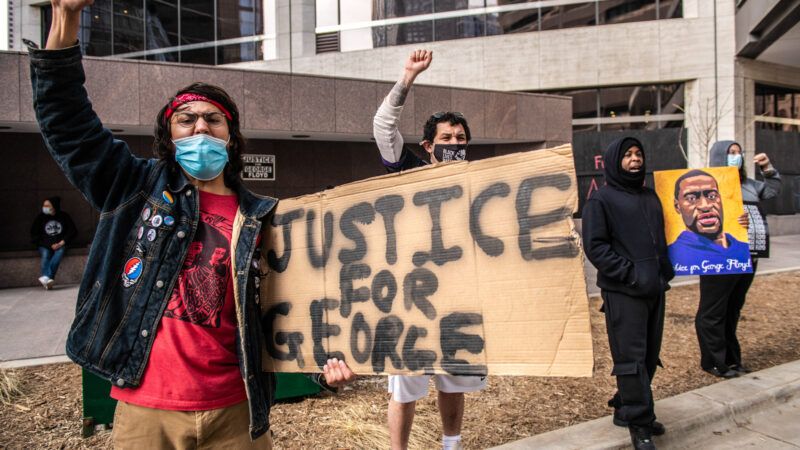A Reinstated Third-Degree Murder Charge Gives Jurors Another Option To Convict Derek Chauvin for Killing George Floyd
Like the felony murder charge, it carries a presumptive sentence more than eight years longer than the manslaughter charge.

The judge presiding over Derek Chauvin's trial for killing George Floyd today reinstated a third-degree murder charge against the former Minneapolis police officer. That is the same charge Chauvin reportedly was prepared to accept under a plea deal that fell through a few days after Floyd's death. The decision to allow a third-degree murder charge, which followed an appeals court's ruling that Hennepin County District Court Judge Peter Cahill had erred in dismissing the count last October, gives the jury another, possibly more appealing option for convicting Chauvin of a crime more serious than the manslaughter charge he also faces.
As of yesterday, five jurors had been seated in the case, and opening arguments are expected to begin on March 29. Potential jurors have been asked about their reactions to the bystander video that shows Chauvin kneeling on Floyd's neck for more than eight minutes during a May 25 arrest for using a counterfeit $20 bill to buy cigarettes. That video—during which a prone, handcuffed Floyd repeatedly complains that he cannot breathe, begs for relief, and cries out for his mother—provoked bipartisan horror and nationwide protests against police brutality last year.
The second-degree manslaughter charge against Chauvin seems to easily fit the facts of the case. It alleges that he caused Floyd's death "by his culpable negligence, creating an unreasonable risk and consciously [taking] the chances of causing great bodily harm to another." While that offense carries a maximum penalty of 10 years in prison, the presumptive sentence under Minnesota's sentencing guidelines is four years.
Chauvin also faces a charge of unintentional second-degree murder, which applies to someone who "causes the death of a human being, without intent to effect the death of any person, while committing or attempting to commit a felony offense"—in this case, third-degree assault. That "felony murder" charge carries a maximum penalty of 40 years in prison, but the presumptive penalty is 150 months, or 12.5 years.
In the vast majority of jurisdictions that authorize felony murder charges, the underlying crime has to be distinct from the act that caused the victim's death. Someone who participates in a burglary or robbery that turns fatal, for example, can be charged with felony murder—a policy that has been widely criticized because it can result in severe punishment for people peripherally involved in crimes that result in someone's death, regardless of their intent or knowledge. But in Minnesota, the "independent felony" rule does not apply, which means an assault that unintentionally kills someone, which ordinarily would be treated as manslaughter, can instead be charged as murder, dramatically increasing the potential penalty.
If jurors reject that logic but think the manslaughter charge does not adequately reflect Chauvin's culpability in Floyd's death, the third-degree murder charge reinstated by Judge Cahill will give them a third option. It alleges that Chauvin caused Floyd's death by "perpetrating an act eminently dangerous to others and evincing a depraved mind, without regard for human life."
Cahill initially rejected that charge because some case law suggests it is appropriate only for conduct that does not target any particular individual—firing a gun into a crowd, for example. He thought a third-degree murder charge could "be sustained only in situations in which the defendant's actions were 'eminently dangerous to other persons' and were not specifically directed at the particular person whose death occurred."
In 2019, however, former Minneapolis police officer Mohamed Noor, who fatally shot Justine Damond in 2017 after she called 911 to report a possible assault in the alley behind her house, was convicted of third-degree murder as well as second-degree manslaughter. The Minnesota Court of Appeals upheld Noor's conviction last month, and it cited that decision last Friday, when it ordered Cahill to reconsider the prosecution's motion to restore the third-degree murder charge against Chauvin. Yesterday the Minnesota Supreme Court declined to review the appeals court's ruling.
The maximum penalty for third-degree murder is 25 years, 15 years less than the maximum for unintentional second-degree murder. But the presumptive penalty is the same: 150 months, which is the sentence that Noor received.
Under a deal that U.S. Attorney General William Barr reportedly rejected in late May, Chauvin would have pled guilty to third-degree murder. Barr's approval was required because Chauvin wanted a guarantee that he would not also face federal civil rights charges for the same underlying conduct. The New York Times reported that Barr was concerned that the sentence contemplated in the proposed agreement—"more than 10 years," according to the Times—would be widely perceived as too lenient. Barr also did not want to preempt decisions by Minnesota Attorney General Keith Ellison, who took charge of the case a few days later.
A federal prosecution theoretically could expose Chauvin to an additional sentence as long as life. But convicting him under federal law would require proving that he "willfully" violated Floyd's constitutional rights, which is a formidable challenge.
Three other former Minneapolis officers—J. Alexander Kueng, Thomas Lane, and Tou Thao—are charged with aiding and abetting Chauvin's assault on Floyd by actively assisting him or failing to intervene. They will be tried separately.


Show Comments (108)